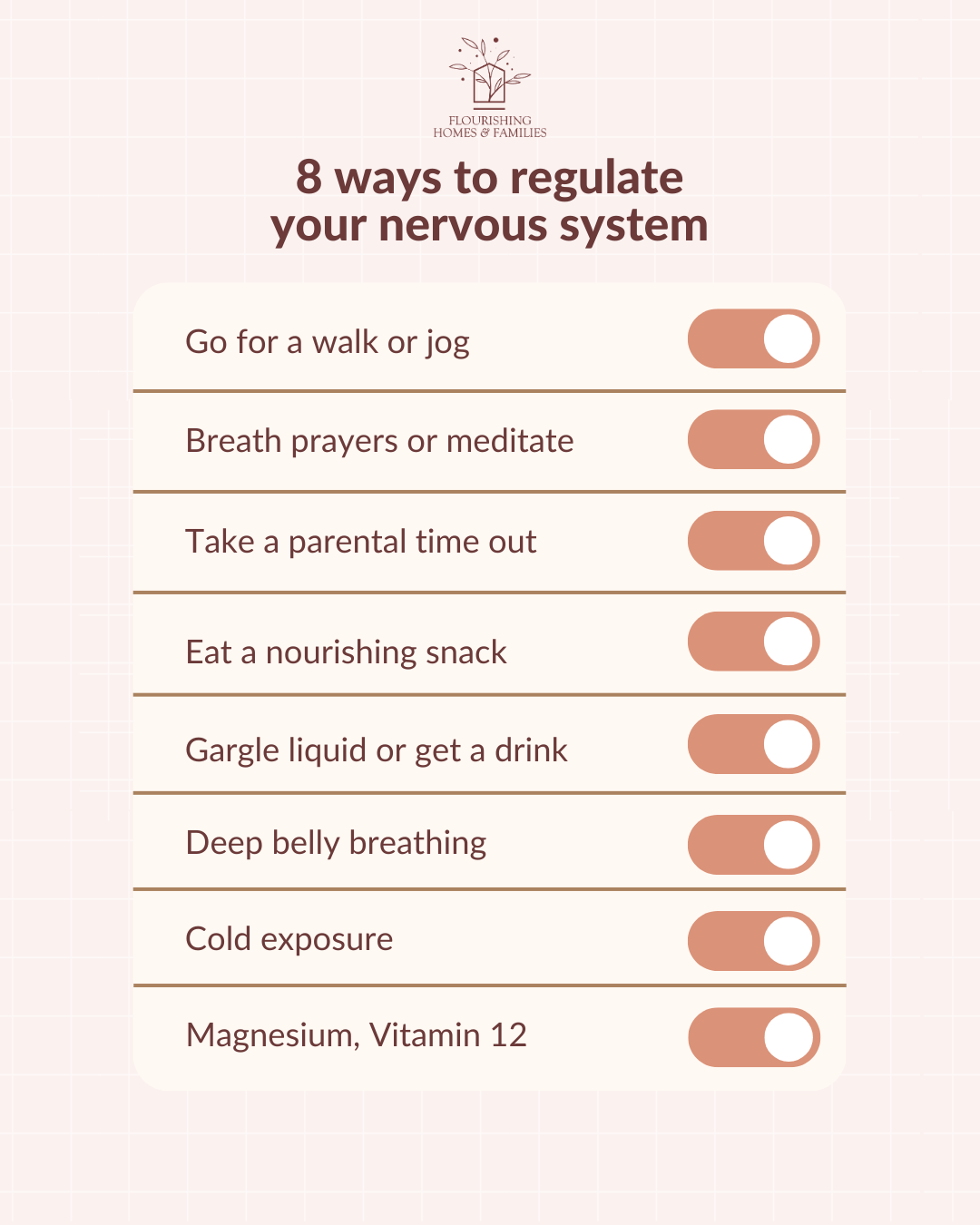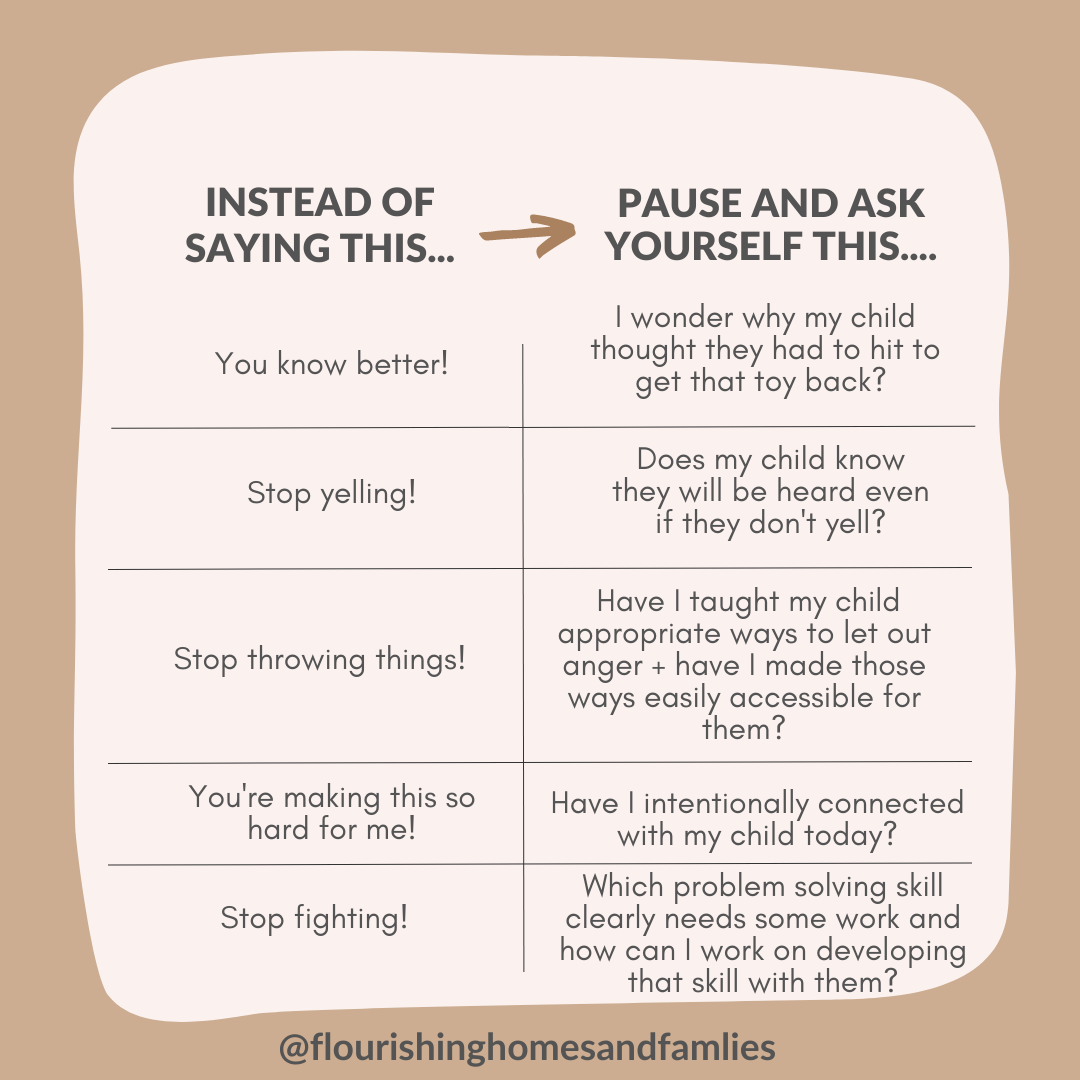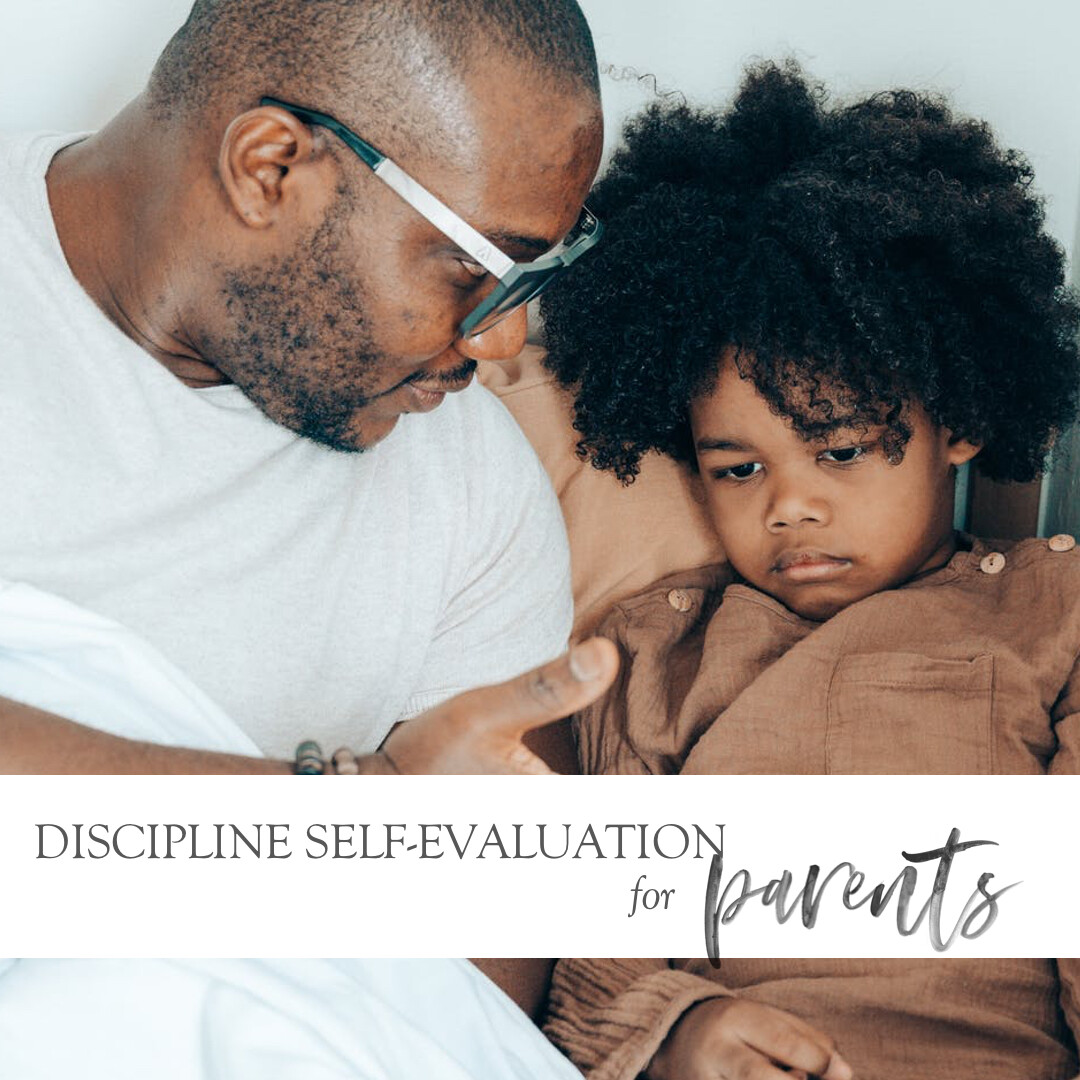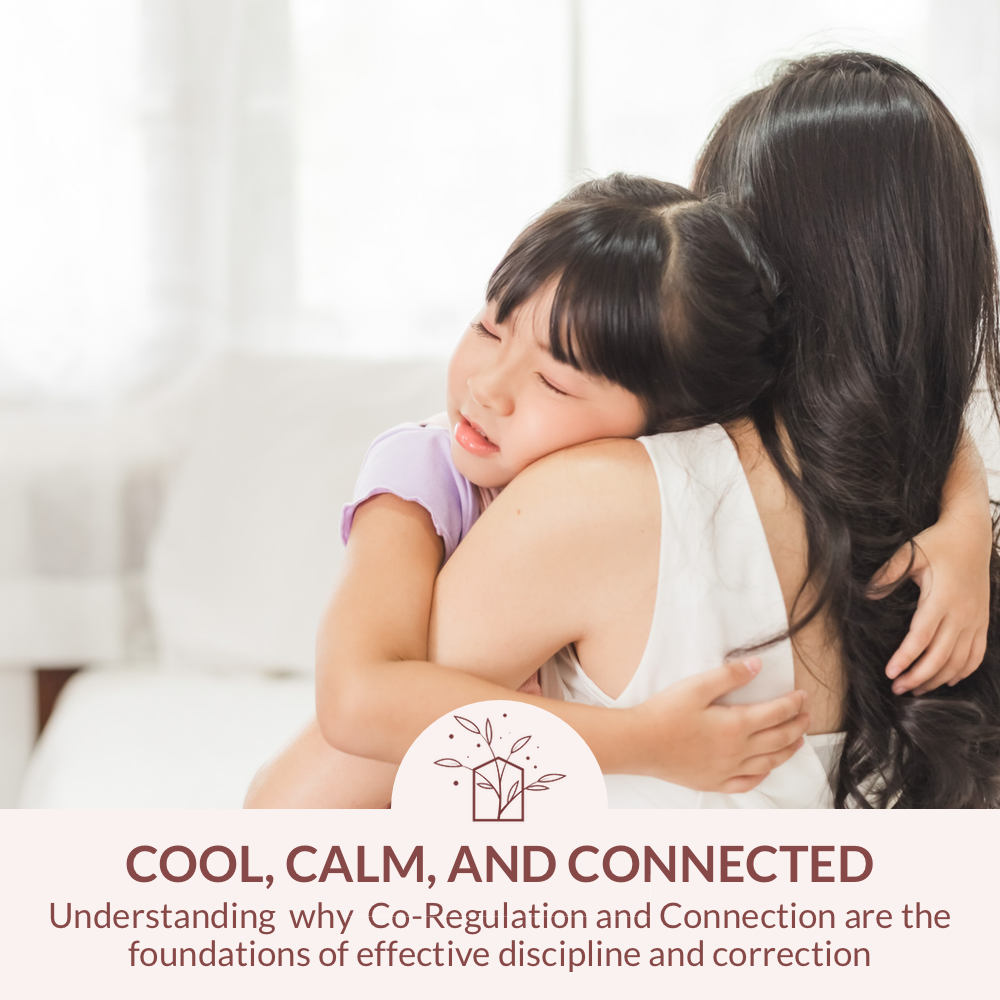
This one's for the mamas, for the ones who sometimes think, “These kids bring out the worst in me?!”
Imagine with me that your impulsive, irrational, exhausted little one is on the verge of pushing your last button. You can feel yourself about to lose your cool, and that’s when the thought crosses your mind: “Arghhhh this kid brings out the worst in me!” We’ve all been there, right? Cue the mom guilt.
This is the exact moment to practice the power of the pause. I totally get that that sounds a little whimsical and a lot cliche, neither of which are all that helpful when you’re patrolling the streets of Meltdown City. But stick with me.
See, that pause is powerful. It gives the Holy Spirit space to nudge your heart, and it gives you space to hear it. That inner voice that quietly counters your own exasperation, whispers, “Or you can choose to let him bring out the BEST in you. Patience. Kindness. Self-control. Empathy. Inner strength that he doesn’t have. You can choose to let him bring out CHRIST in you.”

Talk about powerful! In that split second, we get to choose to let our little ones bring out the worst in us or to let him bring out the BEST in us. And we get the glorious responsibility, and holy work, of choosing!
I want to encourage you today, as a mama who is in that split second of choosing way too often, to be sensitive to those tiny moments when you get to pause and choose. The most effective way our little ones will learn respect and self-control is by seeing respect and self-control in action! I’m preaching to myself here because motherhood is such an opportunity to become more like Christ, and I know I’m not alone in needing the reminder to choose well!
AND FOR WHEN YOU CAN'T CHOOSE
I also want to acknowledge the mamas who feel like they can't choose. When I was deep in postpartum anxiety I experienced rage unlike anything I've ever known. And the hardest thing was that I knew it was wrong, I wanted to change, and in some of the most triggering moments, I couldn't stop the intense reaction and anger coming out of my body. And yes, it landed all over my kids.
I completely understand that reading "You have the power to choose!" can feel disempowering because, in some of those more irrational moments, you would choose to do differently if you could. First, when you can choose, do. Practice it and start over in the middle of an outburst if you catch yourself reverting to old habits. (Neuroscience shows us that even when we start off down an old, unhelpful reaction, stopping and changing in the middle of it helps rewire our neural pathways for future growth and change!)
Secondly, consider getting help. We've shared lots of resources here and on social media. But if you're still experiencing frequent moments where you can't control yourself, please consider talking to your doctor or healthcare provider. I personally benefited greatly from talk therapy and nutritional adjustments. Sometime's Christ's work in us comes from medical and mental health professionals.
You might like:

As a parent or caregiver, it's common to feel overwhelmed and stressed. Knowing how to care for our nervous systems so that we avoid burnout and chronic dysregulation is vital not only for our own health but for our ability to help our children regulate as well. It’s often easy to know when your nervous system is activated. Some of the obvious signs are that you feel like you’re on the verge of losing it! But what does a regulated and calm nervous system actually feel like? Let’s take a look:
What is the nervous system anyway? The nervous system is a complex network of cells and nerves that move information throughout the body. When it is regulated, it functions smoothly, allowing us to feel calm, focused, and in control. In contrast, an unregulated nervous system can lead to feelings of anxiety, stress, and overwhelm. The truly remarkable thing about our nervous systems is that they not only transmit information within our own bodies, they communicate with each other's nervous systems as well! This is why some experts say that a family is one nervous system. As parents, our own nervous systems inform the nervous systems of the entire family.
What does a regulated nervous system feel like emotionally? When your nervous system is regulated, you will feel a sense of balance and equilibrium. You are able to respond appropriately to stressors without becoming overwhelmed, or over-excited, and you can recover quickly from difficult situations or stressors. While you will still experience frustration, fear, anger, and sadness, those emotions are manageable and don't interrupt your day. You're able to think clearly and make decisions with ease.
What does a regulated nervous system feel like physically? Physically, a regulated nervous system is evident in a number of ways. Your breathing will naturally be slow and deep, your heart rate will be steady, and your muscles will be relaxed. You may also feel a sense of warmth and comfort in your body (as opposed to tightness in your chest or a knot in your stomach), indicating that your parasympathetic nervous system is activated and your brain and body feel safe.
This is just a place to start. If you recognize that your nervous system is dysregulated much of the time, these ideas are just a place for you to start on the journey to learning how to regulate your brain, body, and spirit. Regulation doesn't happen overnight, and it isn't a one-and-done event. It's something you'll learn to do over and over again until your state of activation becomes fewer and farther between.
You may want to look into:
- Deep pressure
- Mindfulness
- Meditation and prayer
- Journalling
- Vagus Nerve Stimulation
- Somatic Therapy
This isn't about shaming parents who feel dysregulated most or all of the time! I've been there, and I know how hard it is. My goal is to bring awareness and practical steps you can take to nurture and support your own nervous system so you experience more peace in your body, mind, and spirit.

A note about Magneisum and Vitamin B12
Magneisum is a vital nutrient for every body system and has been found to be soothing to the nervous system. (Magnesium Glicinate or Magnesium L Threonate are the most beneficial.)
VITAMIN B12 is essential for nerve health and brain function. The human body cannot generate this, so it is important to source foods that are rich in B12 or take a Vitamin B 12 or B Complex supplement.
Want to learn more? Our Cool, Calm, and Connected workshop explores various ways to regulate your body, mind, and spirit, and will help you understand the power of co-regulation.

I think we’ve all been there…
Busy with some necessary task and then you hear it. Yelling, crying, and overall upsetness.
Frustration in a parent can sometimes be a huge blinder. It tempts us to get angry and upset with our child's behavior. It pushes us into a position of crisis. We feel the need to eliminate the behavior immediately and that forces us out of the place of peace we need to be in to help them.
This place of frustration and urgency keeps us from looking at their hearts. But that place of looking at their hearts is just exactly where we need to be…
1 Samuel 16:7b “...The LORD doesn’t see things the way you see them. People judge by outward appearance, but the LORD looks at the heart.”
See, what is so important about looking beyond behavior is that this is the only place we can truly correct our children.
Punishing and shaming for behavior does nothing for a child. It gives them nothing–it only takes. It disarms, disempowers, and disengages their little minds from learning.
On the other hand, looking at their hearts and connecting before gently correcting, as Jesus does for us, does the opposite. It GIVES. It equips, empowers, and engages. And here, in this place, a child will learn and flourish.
Next time you find yourself running into a “moment” with your child – try to see their heart over their behavior.
Instead of saying this…pause and ask yourself this..

You know better! → I wonder why my child thought they had to hit to get that toy back?
Stop yelling! → Does my child know that they are heard?
Why are you throwing things?! → Have I taught my child appropriate ways to let out anger + have I made those ways easily accessible for them?
You’re making this so hard for me! → Have I connected intentionally with my child today and given them tools to have some alone time while I complete this task?
Stop fighting with your sister/brother! → Which problem-solving skill clearly needs some work and how can I work on developing that skill with them?
I like how James says:
This you know, my beloved brethren. But everyone must be quick to hear, slow to speak and slow to anger; for the anger of man does not achieve the righteousness of God.
James 1:19-10
Sometimes a simple pause to ask ourselves a question before opening our mouths and speaking helps bring peace and the wisdom of God into a situation. This is where we can use the insight of the Lord to see into their hearts and bring them into our peace where they can learn and grow.
I know sometimes these little changes are sometimes much easier said that implemented. And if the implementation of these swaps feels overwhelming, you are not alone. We have a special community that gently holds each other accountable while offering support via zoom calls, emails, messages, group mentoring–all of it! You’re always welcome to join us. CLICK HERE to learn more.
YOU MIGHT ALSO LIKE
 |

I want to talk to you parent to parent.
For many of us, it didn’t take long to see the obvious error + danger that comes with spanking a child to get them to comply. Hitting kids = not good. It isn’t all that difficult to understand.
But what I want to share with you is that being a gentle, peacemaking parent is a whole lot more than just not spanking.
Not spanking does not equal gentle parenting.
The first is a step in the right direction! The latter is a lifestyle that must be learned and practiced consistently by parents.
Being a peacemaker parent comes from an understanding and appreciation for who your children are, who you are, and who Christ is. If that is a new concept to you, you can read more about that here.
Operating as a person of peace in the raising of our children is such a gift to them and goes far beyond the absence of spanking.
If we choose not to spank but continue yelling, shaming, punishing, and other loud and damaging modalities, we are not peacemaker parents!
A peacemaker parent is Christlike + bursting with the fruits of the Spirit.
Questions to ask yourself in a crisis as you cultivate and pursue being a peacemaker:
Am I operating in the fruits of the Spirit (love, joy, peace, patience, kindness, goodness, faithfulness, and self-control) even when confronted with conflict or crisis?
But the fruit of the Spirit is love, joy, peace, patience, kindness, goodness, faithfulness, gentleness, self-control; against such things there is no law. Galatians 5:22-23
How would Jesus answer my child right now?
The one who says that he remains in Him ought, himself also, walk just as He walked. I John 2:6
The one who says that he remains in Him ought, himself also, walk just as He walked. I John 2:6
Are my hands and arms open to give love + grace to my child in their time of need?
I have spread out My hands all day long to a rebellious people, Who walk in the way which is not good, following their own thoughts. Isaiah 65:2
I have spread out My hands all day long to a rebellious people, Who walk in the way which is not good, following their own thoughts. Isaiah 65:2
Is my voice soft + gentle or is it big + scary?
A gentle answer turns away wrath, But a harsh word stirs up anger. Proverbs 15:1
A gentle answer turns away wrath, But a harsh word stirs up anger. Proverbs 15:1
Would I be proud to show someone how I am confronting this situation?
Be diligent to present yourself approved to God as a workman who does not need to be ashamed, accurately handling the word of truth. II Timothy 2:15
Be diligent to present yourself approved to God as a workman who does not need to be ashamed, accurately handling the word of truth. II Timothy 2:15
These questions are hard to ask ourselves sometimes–and we need to remember that the Lord always gives us grace as He empowers us with His Spirit. Chances are, there will be many times that the answers to these questions are "no". But we keep trying and keep working toward the goal of being a peacemaker.
At the end of the day, we do our best as parents. There is no perfect parent, but we do have a perfect model–Jesus Christ. We always look to him. The author and finisher of our faith and we model His methods, His ways, and His teaching the very best that we can as we raise our little disciples to be like Him.
You might also like
 |

If you’re a parent to a child anywhere from toddlerhood to early elementary age, they just might benefit from a Grace Space.
You may have heard of this before–others might call it a time-in space, calm corner, or rest nook. Whatever you decide to call it, the idea is more or less the same: It is a safe space for your child to regulate.
If your child is really worked up, it could be more along the lines of a place for co-regulation–meaning you can join them in this space and show them how they can use the tools to help.
- Location location location! Sounds like a real estate listing, right?! But truly, location does play a big role in the functionality + usability of a Grace Space. Look for a corner or area of your home that is generally free from clutter, not in the middle of much traffic, and a space that doesn’t feel claustrophobic. We found that having a great view of the outdoors was helpful for our family.
- Set the mood: Make this a designated area that is easily marked and identified. If it’s easy to miss or just like everywhere else in the house, it might make it a little harder for a child to gravitate to it when they need it. We have a beautiful set of downloadable Grace Space posters that will best suit your family + even the aesthetic of your home if you’re a little hyper-sensitive to those things like I can tend to be. These are super easy to print and frame and use to make this area of your house feel extra special.
 check out our grace space calm down kit
check out our grace space calm down kit - Equip the space: A place to sit, and a small basket or shelf with just a few simple cam activities will do the trick. This can be customized to the needs of your child really easily. Here are a few ideas:
- Bean bag chair
- Assortment of comfy throw pillows
- Fidget toys
- Simple books about emotional regulation (check out our Teach with Toys list)
- Model how to use it: Be quick to use this as a space first with your child. Be excited and confident in how cool and effective your Grace Space is! Normalize it and be thankful for it.
Every Grace Space setup is a little different but the goal is the same– a safe place for your child to learn regulation and get back into a place of peace.
Let us know how a grace space looks in your home. Ideas are always welcome!















